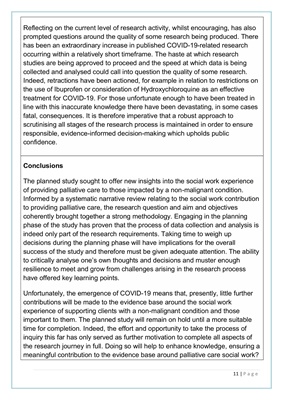
11 | P a g e
has been an extraordinary increase in published COVID-19-related research
occurring within a relatively short timeframe. The haste at which research
studies are being approved to proceed and the speed at which data is being
collected and analysed could call into question the quality of some research.
Indeed, retractions have been actioned, for example in relation to restrictions on
the use of Ibuprofen or consideration of Hydroxychloroquine as an effective
treatment for COVID-19. For those unfortunate enough to have been treated in
line with this inaccurate knowledge there have been devastating, in some cases
fatal, consequences. It is therefore imperative that a robust approach to
scrutinising all stages of the research process is maintained in order to ensure
responsible, evidence-informed decision-making which upholds public
confidence.
Conclusions
The planned study sought to offer new insights into the social work experience
of providing palliative care to those impacted by a non-malignant condition.
Informed by a systematic narrative review relating to the social work contribution
to providing palliative care, the research question and aim and objectives
coherently brought together a strong methodology. Engaging in the planning
phase of the study has proven that the process of data collection and analysis is
indeed only part of the research requirements. Taking time to weigh up
decisions during the planning phase will have implications for the overall
success of the study and therefore must be given adequate attention. The ability
to critically analyse one's own thoughts and decisions and muster enough
resilience to meet and grow from challenges arising in the research process
have offered key learning points.
Unfortunately, the emergence of COVID-19 means that, presently, little further
contributions will be made to the evidence base around the social work
experience of supporting clients with a non-malignant condition and those
important to them. The planned study will remain on hold until a more suitable
time for completion. Indeed, the effort and opportunity to take the process of
inquiry this far has only served as further motivation to complete all aspects of
the research journey in full. Doing so will help to enhance knowledge, ensuring a
meaningful contribution to the evidence base around palliative care social work?